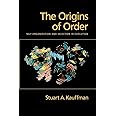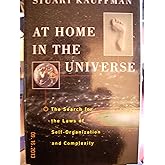
Amazon Prime Free Trial
FREE Delivery is available to Prime members. To join, select "Try Amazon Prime and start saving today with FREE Delivery" below the Add to Cart button and confirm your Prime free trial.
Amazon Prime members enjoy:- Cardmembers earn 5% Back at Amazon.com with a Prime Credit Card.
- Unlimited FREE Prime delivery
- Streaming of thousands of movies and TV shows with limited ads on Prime Video.
- A Kindle book to borrow for free each month - with no due dates
- Listen to over 2 million songs and hundreds of playlists
Important: Your credit card will NOT be charged when you start your free trial or if you cancel during the trial period. If you're happy with Amazon Prime, do nothing. At the end of the free trial, your membership will automatically upgrade to a monthly membership.
Buy new:
-25% $97.46$97.46
Ships from: Amazon Sold by: Pen Book
Save with Used - Good
$20.77$20.77
Ships from: Amazon Sold by: Soulful Noble LLC

Download the free Kindle app and start reading Kindle books instantly on your smartphone, tablet, or computer - no Kindle device required.
Read instantly on your browser with Kindle for Web.
Using your mobile phone camera - scan the code below and download the Kindle app.

Follow the author
OK
The Origins of Order: Self-Organization and Selection in Evolution 1st Edition
Purchase options and add-ons
- ISBN-100195079515
- ISBN-13978-0195079517
- Edition1st
- PublisherOxford University Press
- Publication dateJune 10, 1993
- LanguageEnglish
- Dimensions6.11 x 1.32 x 9.18 inches
- Print length734 pages
Frequently bought together

Customers who viewed this item also viewed
Editorial Reviews
Review
Book Description
About the Author
Product details
- Publisher : Oxford University Press; 1st edition (June 10, 1993)
- Language : English
- Paperback : 734 pages
- ISBN-10 : 0195079515
- ISBN-13 : 978-0195079517
- Item Weight : 2.2 pounds
- Dimensions : 6.11 x 1.32 x 9.18 inches
- Best Sellers Rank: #646,546 in Books (See Top 100 in Books)
- #417 in Oncology (Books)
- #1,187 in Ecology (Books)
- #2,901 in Biology (Books)
- Customer Reviews:
About the author

Discover more of the author’s books, see similar authors, read book recommendations and more.
Customer reviews
Customer Reviews, including Product Star Ratings help customers to learn more about the product and decide whether it is the right product for them.
To calculate the overall star rating and percentage breakdown by star, we don’t use a simple average. Instead, our system considers things like how recent a review is and if the reviewer bought the item on Amazon. It also analyzed reviews to verify trustworthiness.
Learn more how customers reviews work on AmazonTop reviews from the United States
There was a problem filtering reviews right now. Please try again later.
- Reviewed in the United States on April 10, 2022If you are interested in complexity, self organization, biology, economies etc. Stu Kaufman is one of the greats. I had been studying these ideas for years in and around MIT, but this book is so clear and rigorous that it took me a while s to get over being unready to have written it. Maybe too intense for laymen, but full of brilliant ideas and analysis. Highly recommended.
- Reviewed in the United States on September 10, 2023Terrific book. Great ideas.
- Reviewed in the United States on October 9, 2011What an amazing book. It certainly puts you back in your place in the scheme of things and our position in the order of eveolution. Fantastic loved it.
- Reviewed in the United States on May 8, 2016Awesome book that you need absolutely
- Reviewed in the United States on March 6, 2015it is very good.fast and excellent
- Reviewed in the United States on August 27, 2015excellent!
- Reviewed in the United States on June 15, 2002Stuart Kauffman has an MD and is a generalist. The book deals primarily with theory and understanding of computer simulations of state driven systems of large numbers of connected nodes. It examines how such systems evolve through mutation and gives a clear understanding of the limited role of natural selection in comparison to the self-organizing forces at work within such systems. It examines the meta-interaction of sub-systems of interacting states (attractor basins) that occur within a system. In English: it gives the first theoretical framework for understanding just how it is that cells which all contain identical DNA express themselves as some number of stable cell types. Normally a cell will react to a perturbation in whatever way will return it to its base stable cycle (attractor loop). One type of cell turns into another type when just the right perturbation kicks the system from one attractor basin into a different attractor basin.
This is heavier reading than his popular science book, At Home in the Universe, but preferable for anyone with the necessary tiny amount of knowledge of genetics and logic operations. There are few equations of any kind. The results apply to more than just biological systems.
The book is long because instead of just presenting a few principles that you can try to remember abstractly, he leads you through all the important steps of his research and gives you a real feel for how complex systems actually evolve and operate. The book raises more questions than it answers, as it should be for a book of such originality and importance.
When you fully grok the contents of this book you'll be so excited you'll want to rush and explain it to someone else, which will be utterly impossible, so you'll probably have to lend them your book, buy them the popular version, or face the fact that you are now relatively alone on a higher plane.
- Reviewed in the United States on April 19, 2016The author is in love with the sound of his own voice. Far more language is used to describe even simple things than should ever be necessary.
Top reviews from other countries
-
 Yuchen LUReviewed in France on October 19, 2018
Yuchen LUReviewed in France on October 19, 20185.0 out of 5 stars un livre inspirant
l'interlocuteur sur ligne est sympa
 N. BwtsReviewed in the United Kingdom on November 28, 2017
N. BwtsReviewed in the United Kingdom on November 28, 20175.0 out of 5 stars Superb!
To follow the main arguments put forward in the book you dont need to have a strong background in Biology in my opinion but a techincal background in some area of computational modelling is invaluable. He takes a very geometrical approach which is fine if, like me, you have a visual kind of mind, if not you may struggle. Serioulsy not an entry level book!
That said it is frankly an amazing piece of work.
Anybody with serious intent on getting their heads around these issues should definitley consider the commitment needed to read it.
 Amazon CustomerReviewed in Australia on July 14, 2022
Amazon CustomerReviewed in Australia on July 14, 20225.0 out of 5 stars Excellent
Very good
-
 JulioReviewed in Spain on December 31, 2012
JulioReviewed in Spain on December 31, 20124.0 out of 5 stars Un libro sugestivo
Para interesados en Biología teórica.
Especulación razonada sobre la aparición del orden en la materia viva, dentro de la teoría evolucionista.
-
 ケイ太郎Reviewed in Japan on January 1, 2016
ケイ太郎Reviewed in Japan on January 1, 20165.0 out of 5 stars The Origins of Order: Self-Organization and... Stuart A. Kauffman
分厚い書物ですが、毎日ページ数を決め一気に読み通すほど、簡潔で内容が深い。秩序という生命の基本を十分に理解する良い手だてがいっぱいあります。











